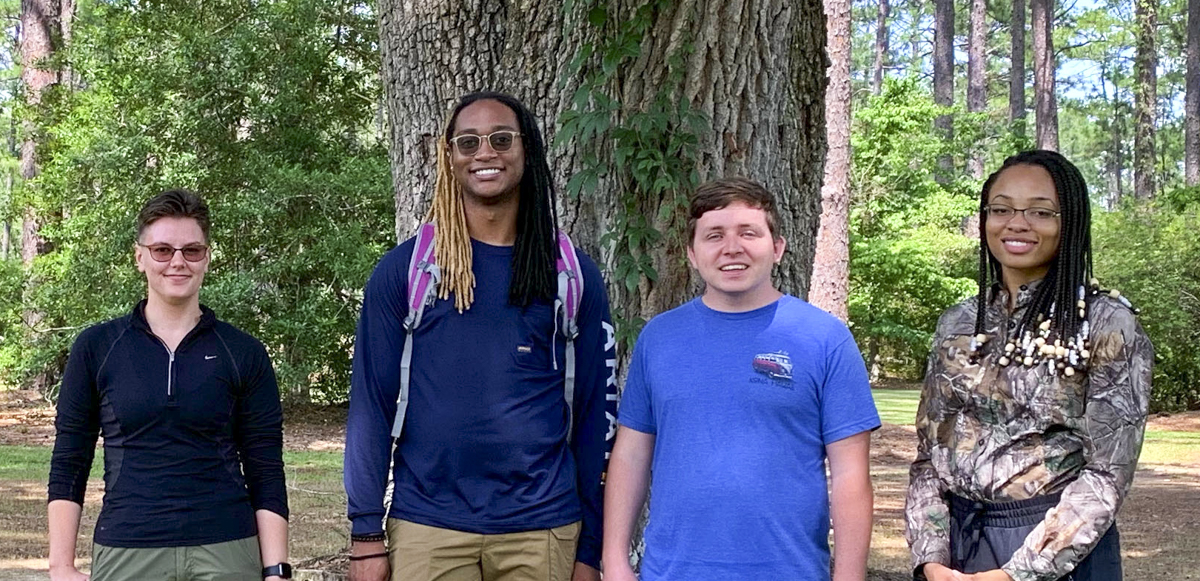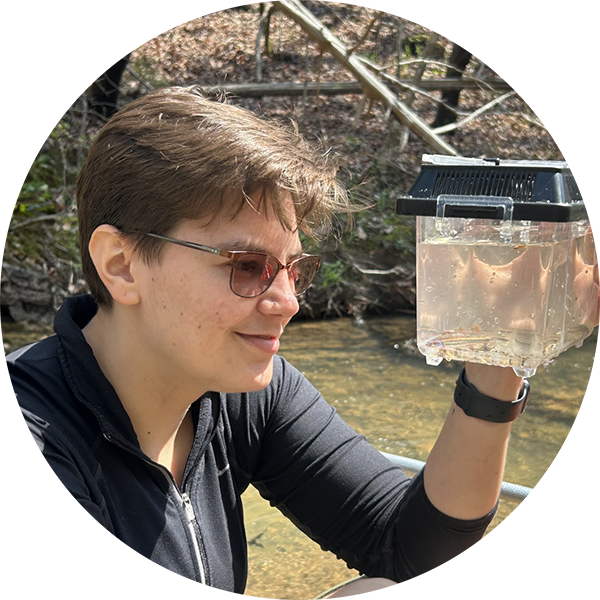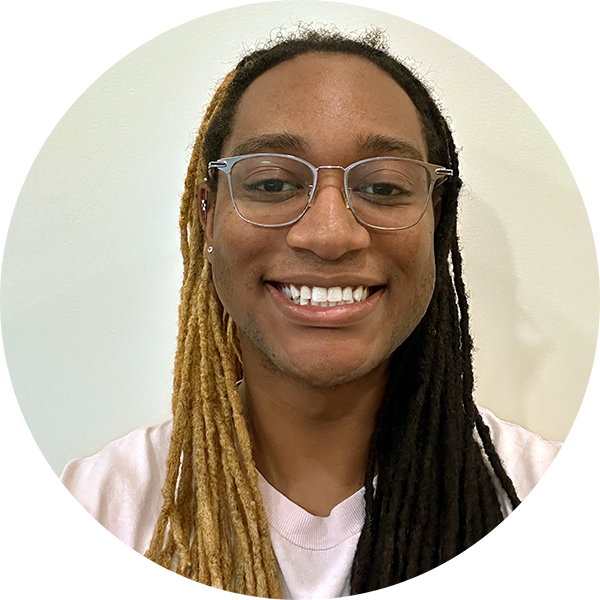Natural Resources Research & Management
Natural Resources Research & Management
The Woods to Water (W2W) project is an experience-based post-baccalaureate learning program aimed at helping early career scientists understand critical linkages between terrestrial and aquatic ecosystems. Over a 12-month period, participants will be introduced to standardized field techniques and data collection, conduct an independent study with a research mentor, and present a research poster at the program’s end. Funding was provided by a National Science Foundation Research and Mentoring for Postbaccalaureates (NSF RaMP) grant to The University of Alabama and The Jones Center at Ichauway in partnership with NSF National Ecological Observatory Network (NEON).

We welcomed the first cohort of “RaMPers” to Ichauway on June 4. These budding scientists will spend the next 5 months with Center research staff conducting field and lab work. From left to right, we have Jenna Jackson, LaDerrius Hannah, Luke Barnes, and Jewell Johnson. Read a little about them below:

I am originally from Tuscaloosa, AL and I graduated with a B.S. from the University of Alabama specifically in marine science and biology. During my time as an undergraduate I worked in the university’s ichthyology collection, so the majority of my previous experience is in fish collection and identification. However, I also worked at BASF in their environmental lab as a technician for a year working to keep their waste water within EPA regulations. As for my other interests, I am an avid enjoyer of Formula 1 racing, dystopian novels and classics, video games, and French language/culture.

I am from a very small town in central Alabama called Centreville. I’ve always had a love for biology. Growing up, I spent 90% of my time outside exploring the nearby forest with the other neighborhood kids. I was very interested in marine life, so I decided to get my Bachelor of Science in Marine Biology. I’m really interested in food web dynamics and nutrient cycling in ecosystems. I had very little experience prior to this program. I was enrolled in Dauphin Island Sea Lab, where I took some awesome classes such as Shark and Ray Biology, Restoration Ecology, and Vertebrate Zoology. These classes involved a lot of hands-on field work that changed the way I see natural science.

I was born and raised in the Arkansas River Valley. I went to college in my hometown of Fort Smith at the University of Arkansas – Fort Smith and got a degree in Biology. My most specific interest is in fish, but overall, I just enjoy being in creeks and aquatic ecosystems and observing anything and everything that resides within these ecosystems. My second love after aquatics is plants; I thoroughly enjoy foraging and love flowers. My prior experience was limited as I came from a small school with limited opportunities; however, I did have a professor who took me under his wing, Dr. Kannan, and we worked on two projects together that culminated in two publications. Most of my contributions consisted of gathering data from citizen science databases such as eBird and iNaturalist and organizing them in ways that allowed us to ask questions and find answers.

I was born and raised in Lithonia, GA, 30 minutes from the Atlanta area. My initial interest in the ecological sciences started with my father. I vividly remember watching documentaries when I was a child and being so fascinated by all of Earth’s wonders. In high school, I participated in the Fernbank Scientific Tools and Techniques Program. There I learned general skills like teamwork, timeliness, and adaptability. I also learned laboratory skills and field methods. These skills helped me tremendously when I came to college at Valdosta State. In my undergraduate, I had the opportunity to do research in a bioacoustics lab. I worked under two ecologists with backgrounds in ornithology and herpetology. This expanded my interest greatly and taught me more about the research process.

I have been interested in nature/ecology practically since I was born. My interest was furthered by David Attenborough and nature documentaries as a whole. Originally, I was only focused on marine systems and while I have a deep love for them, I want to broaden my scope of interest to other ecological disciplines.

I took a couple of ecology classes as an undergraduate and I really fell in love with the idea of ecology. I saw ecology as a giant project that helped repair ecosystems and their vital functions. After learning that ecology has so many branches of science involved, I couldn’t help but be intrigued.

From a young age, I’ve always loved nature. I enjoyed catching frogs, toads, bugs, and fish, in addition to eating honeysuckle with my mom. I was also rather aware in my youth. I knew of and was concerned about climate change from a very young age. In high school, my interests began to become more focused as I accumulated more knowledge and had an outlet that was previously unbeknownst to me by which I could express my interests more specifically. In 10th grade biology, we learned about evolution and ecology at a rudimentary level, and it was very intriguing to me. During the 11th grade, I took Environmental Science and became even more engrossed in ecological concepts and got in contact with Dr. Kannan through my Environmental Science teacher. So, I’ve always had these interests, but they slowly became more fine-tuned and directed as I accumulated knowledge and became more aware of what was out there.

When I was in high school, I participated in the Fernbank Scientific Tools and Techniques Program. At this program, I was able to take classes in different types of sciences and develop my interests. When I took ecology, I really liked how holistic the approach was by looking at how organisms interact with their environment. These complex interactions excited me, and the discipline can include many different scientific backgrounds. My interest in conservation came a little later when I really started to understand climate change. I felt frustration about these problems being much bigger than me but reading about successful conservation efforts gave me inspiration. This gave me the drive to pursue this as a career so that I can play my part.

It is always exciting to experience the research of various labs, however, I am most keen on learning more about native plants and non-fish species identification. I truly want to learn as much as I possibly can while in this program. Afterwards, I am hoping to complete a master’s degree and PhD. My long-term goal is to do ecological based research at a university though that might change while going through this program.

I took a couple of ecology classes as an undergraduate and I really fell in love with the idea of ecology. I’m looking forward to learning what career path I want to pursue. I am also excited to meet new people and the paths they took to achieve their career. My primary goal is to attend graduate school. I want to further my education and eventually become a successful researcher.

My goal is to soak up every single opportunity I can. My preference would be to work in Dr. Golladay’s mussel lab, as it is right up my wheelhouse and would give me the field experience in aquatic communities under the guidance of a professional that I was lacking in undergraduate due to a lack of opportunities and resources in the area, so that is my hope. But, regardless, I plan to learn as much as I can about the various fields and to become engrossed in these organisms and ecosystems around me, as well as to familiarize myself with the various techniques which pertain to the labs. After I complete the Woods to Water Program, it is my goal to enter into a master’s program, and then a PhD with the idea of potentially working in academia.

While in the W2W program, I really want to experience much more field work. A common weakness in the resume of students applying to graduate school is experience and this program will give me a full year of it! I’m also interested in all the various disciplines and approaches in ecology. I want to understand what my specific interests are, what I would like to research, and interact with people who are like minded. I hope to learn about the technology that scientists use and what things I can measure with them. Experimental design has also been a big interest of mine and this is the why and how we collect data in the most optimal way. Networking is another interest. I really want to communicate with professionals who are later in their career and understand the skills needed to get a job.

Although I am still very early in my career, I will say that true passion and dedication to conservation will enable you to go far. Passion for the natural world has always kept me driven and dedication to the work has opened many opportunities. Additionally, don’t let any decision or prior expectation narrow your thinking for the future. I began college as an environmental engineering major and spent a good amount of time in that field. Many others expected me to become an engineer, but I wanted something different out of life so be flexible with yourself.

If you are planning on majoring in conservation related programs, I highly recommend that you get experience wherever you can. Ask your advisors if there are any internships or programs available. Without experience your opportunities will be heavily numbered. Secondly, try your best in your other classes too. Don’t just work hard for the classes you’re interested in, work hard in all of them. You never know what information you learn in other classes can be used in conservation.

My advice is to have passion. Knowledge is great, experience is great, opportunities are great, but it is my opinion that what is most valuable is passion. The whole purpose of our field is to protect the species with which we share the planet; to watch over and restore the myriad ecosystems which make up a beautiful mosaic. No amount of education or experience alone can grant us success in our endeavors, they are secondary assets. We are our Brother’s Keeper, and as such, what is most pertinent is love and passion for our fellow inhabitants and our place of refugia in this corner of the universe.

Try your hardest to do undergraduate research. The skills I learned in my research class were not taught in regular academic courses. Things such as how to go over scientific literature, PCR DNA amplification, experimental design, and initial field work. Also, skills such as how to approach professors and developing confidence at scientific conferences. Do not be afraid to approach a professor with your interest and ask to do research. I went up to my mentor and asked him if I could write a research proposal for the following semester. This is how I ended up pursuing that project and learning that taking the initiative can work. Do not wait for an opportunity to come to you, make one for yourself.

The Soul of an Octopus by Sy Montgomery

A must read for anyone interested in natural resources is Robinson Crusoe by Daniel Defoe. It’s not exactly about science but it teaches you important lessons that can be applied in today’s world. It is about a man being stranded on a lost and uninhabited island. Robinson, the protagonist, learns through keen observation about how to survive and maintain a functional environment on the limited space known as the island itself. He studies the local fauna and their behaviors. He even applies the scientific method to capture, breed, and protect all endemic species. Although the protagonist learns all this for the sake of survival, he learns about all sorts of key ecological functions. Nature plays a big role in this book, and I believe any scientist would enjoy the critical thinking applied by the main protagonist.

There are many great books. I will leave two recommendations. The first is Braiding Sweetgrass: Indigenous Wisdom, Scientific Knowledge, and the Teaching of Plants. It is by an Indigenous botanist named Robin Wall Kimmerer and offers a refreshing mindset and lifestyle perspective on ecology which has been tried and tested by time, and ultimately one that we really ought to embrace if we want to form and ameliorate our relationships with each other, the other species which inhabit Earth, and the Earth itself. The other is Hurricane Lizards and Plastic Squid: The Fraught and Fascinating Biology of Climate Change by Thor Hansen. In it, he looks at how different species are already adapting and evolving in response to climate change, which offers hope for us and our efforts as we fight for a plethora of conservation issues in spite of what seems to be a multitude of daunting and insurmountable challenges.

The Thinking Body by Mabel Elsworth Todd
Freshwater mussels are one of the most imperiled groups of organisms in the world with approximately 70% of the United States’ nearly 300 species considered endangered, threatened, of special concern, or extinct. This is extremely relevant to scientists in the southeastern U.S., as we host around 91% of U.S. mussel diversity. Although mussels appear to live unassuming lives, they contribute important ecosystem services including water quality improvement and nutrient cycling. Adding to their allure, mussels trick fish into carrying their larvae around streams, rivers, and lakes. No free rides, huh? Biologists at The Jones Center developed a new guide with an introduction to freshwater mussel biology and descriptions of the twenty-five currently known mussels in our basin.
“I think it is easy to see all freshwater mussels in the same way, but the more we learn, the more we see how untrue that is,” says Assistant Biologist and lead author, Caitlin Sweeney.
“In addition to describing the physical differences in our local diversity, one of my goals for this guide was to emphasize the many differences our species have in life history. Different species can have life expectancies that vary by many decades. Species mature at different rates, use different fish hosts, attract hosts differently at different times of year, and have differing habitat preferences and tolerances to harsh conditions. Unfortunately, the life history of many species remains largely unknown. Learning and compiling this information is an important step towards conservation and recovery.”
“The photographs in the guide are another strong point that we’re very proud of. Mussel guides aren’t common, and they often rely on images of dead mussel shells. Photos of live mussels aren’t just beautiful, they also help with training for species identification,” says co-author and Associate Biologist, Steve Golladay.
“The only way to photograph live mussels is to get in the water and find them. We performed sixty-two surveys last year for a Habitat Conservation Plan, and we took advantage of the opportunity to photograph them in their natural habitat. We’ve recorded lures from species that we’re not sure anyone else has seen or captured.”
Mussel work at The Jones Center began in 1999 when graduate student Paula Gagnon started investigating the habitat requirements of recently listed endangered species. The Aquatic Biology Lab returned in 2001 following a multi-year drought to assess its impacts on mussel populations in the lower Flint Basin. Now the Affiliate Mussel Conservation Lab is working alongside local farmers, state biologists and hydrologists, and policy makers through the Georgia Flow Incentive Trust (GA-FIT) to develop a Habitat Conservation Plan. Under the plan, new water management strategies would support our freshwater mussels and our regional agricultural economy. We are evaluating data from the 1999 and 2001 surveys with 2023 surveys to assess population recovery and conservation actions.
Steve Golladay says one of the exciting results from the 2023 surveys was observing evidence of recruitment from Shinyrayed Pocketbooks, one of our federally endangered species. “We are finding it in locations that it disappeared from following the extended droughts between 1999-2012. There is still room for concern and the number of federally listed mussels in our basin continues to grow, but we believe our work with GA-FIT will make a big difference for mussels and local farmers. We hope this guide grows an appreciation for our diverse populations of mussels.”
Rachel McGuire, The Jones Center at Ichauway
rachel.mcguire@jonesctr.org
Stephen W. Golladay, PhD, The Georgia Water Planning and Policy Center at Albany State University
steve.golladay@jonesctr.org
Caitlin Sweeney, The Jones Center at Ichauway
caitlin.sweeney@jonesctr.org
This guide was produced with support from The Jones Center at Ichauway with funding from the Robert W. Woodruff Foundation. Additional funding came from the Georgia Water Planning and Policy Center at Albany State University.